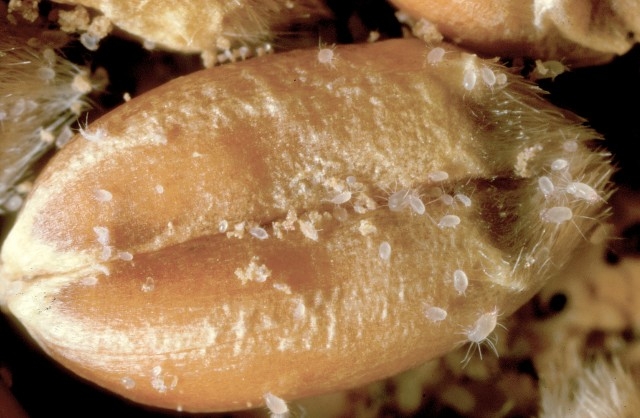
Poor store hygiene can lead to significant mite and pest attacks of stored grain, which can spoil quality, can be responsible for between 5% and 10% loss of yield or even lead to complete rejection. With harvest not so far away and with control measures starting up to one month before harvest, now is the time to plan what action you are going to take. Growers need to maintain grain quality and yield in store so that they make as much profit as they can, even though prices are not as buoyant as they have been, says Peter Waite of Dow AgroSciences.
In fact this pricing issue may mean small parcels of grain, kept to sell in May/June, are still in store, ready to go when prices firm. Last year’s harvest was a good one, so there was more grain to deal with than in the previous year, he points outs.
“It is important to protect the investment made in the crop so far when moving from field into store. Mite and pest infestations result in significant direct losses due to their feeding. Grain quality can be adversely affected, with problems of reduced nutritional value, taint and contamination of insect fragments. The presence of mites can give rise to mould infestations as moisture and heat in the grain heap increases. Mites and pests also act as a source of allergens leading to difficulties when feeding animals,” he says.
Peter reminds growers that various species of mites, weevils, beetles and moths are frequent problems in grain stores and grain heaps. “Saw-toothed grain beetle and flour mites are the most commonly occurring pest species in grain, yet some insecticides have no effect on mites. Working by contact, ingestion and fumigant activity, the acaricide and insecticide Reldan 22 (based on chlorpyrifos-methyl) controls all major pests of stored grain. In fact it is the only pre-harvest grain store fabric treatment that controls the three main mite species – flour mite, Cosmopolitan food mite and Copra mite.”
“In addition it controls a long list of other insects - Saw-toothed beetle, Rust-red grain beetle, Foreign grain beetle, Rust-red flour beetle, Confused flour beetle, Merchant grain beetle, Indian meal moth, Warehouse moth, Mediterranean flour moth, Grain weevil and Rice weevil.”
Reldan 22 is best used as part of an integrated management approach to treat the fabric of the store. This process starts by completely emptying stores of old grain or any debris. Any handling equipment such as airways, ducts, intake pits and elevators should be swept or cleaned using a high pressure airline, paying attention to cracks and crevices where pests will harbour. The sweepings need to be disposed of well away from the grain store site or be burnt.
“There are several application options for Reldan 22 - by knapsack sprayer or by tractor-operated spray lance. The product is applied at 200 mls in 5 litres of water per 100 square metres when treating the fabric of the store. It should be applied up to 4 weeks before harvest. One treatment is allowed. There is no withholding period.”
“It can also be used on harvested grain coming into store as an admixture treatment. In this instance Reldan 22 is applied using a suitable applicator to grain that has been dried, cooled and cleaned. After this admixture treatment, grain should not be processed for 90 days, so this approach is most suitable for grain intended for long term storage. Just one application can be made per batch.”
Peter Waite explains that Reldan 22 is approved for use on grain store structures and equipment as well as on stored grain heaps of wheat, barley, oats, rye and triticale. “It is accepted by the British Beer and Pub Association (BBPA) and the Brewing Research International (BRI) for use on cereals for malting and brewing.”
Reldan 22 (22.5% w/w chlorpyrifos-methyl specially formulated as an Emulsifiable Concentrate and packed in a 1 litre pack) is recommended as a broad-spectrum acaricide and insecticide for the control of mites and insects infesting grain stores and stored cereal grain. For pre-harvest hygiene in grain stores, apply 200 mls of Reldan 22 in 5 litres of water per 100 square metres of surface. There is no withholding period when used in grain stores.
For best practise, ensure good ventilation during application and wear a face mask fitted with an activated charcoal filter.
For admixture treatment application rates are based on grain conveyer throughput. If throughput is less than 5 tonnes per hour, apply 20 ml of Reldan 22 in 1.5 litres of water per tonne of grain. If throughput is more than 5 tonnes per hour, apply 20 ml Reldan in 0.75 litres of water per tonne of grain. For admixture treatment there is a 90 day withholding period. Just one application can be made per batch.
